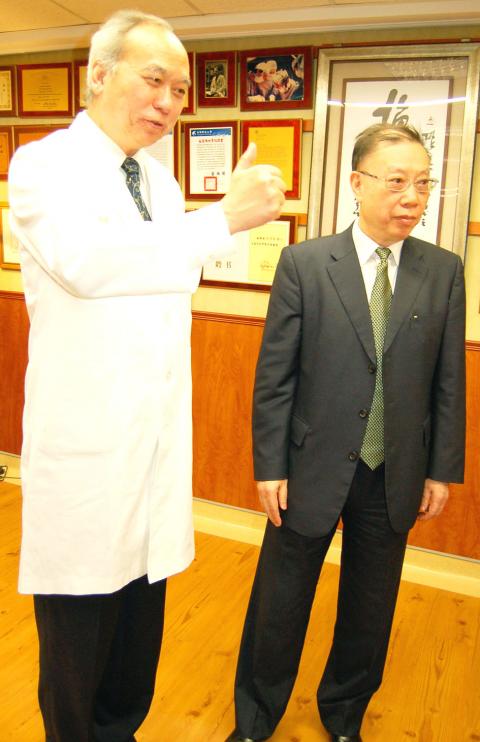A former Chinese vice minister’s offer to help set up a mechanism to facilitate organ donations from China to Taiwan should be viewed with caution, considering its legal and political implications, officials and the head of an organ registry center said.
Speaking at Chang Gung Memorial Hospital in Greater Kaohsiung yesterday, former Chinese deputy minister of health Huang Jiefu (黃潔夫) said that China would cease using organs of executed prisoners next year, and that Beijing hoped to establish a platform to legally transport organs to Taiwan for organ transplant procedures.
Saying that Chinese regulations on organ donations are far looser than Taiwan’s and hinting at China’s greater supply base, Huang said there are about 10,000 organ transplants being carried out in the country annually.

Photo: Chen Wen-chan, Taipei Times
“Although the demand is currently greater than the supply, we believe that the magnanimity of the Chinese people will eventually prevail and allow for greater numbers of organs to be donated after the ban on using organs from executed prisoners,” said Huang, now the head of the National Organ Transplantation Committee at China’s National Health and Family Planning Commission.
“In the eyes of China, both Hong Kong and Taiwan are considered ‘domestic territories,’ and it is quite normal for citizens to donate their organs to one another,” Huang said.
Transportation of the organs — which can be kept in 4oC containers for 16 to 24 hours — would not be a problem, he said.
Responding to Huang’s comments, senior adviser to the Presidential Office Steve Chan (詹啟賢) said he was willing to endorse such a project because it is a “good thing,” but further understanding of legal regulations should be considered.
Taiwan Organ Registry and Sharing Center chairman Lee Po-chang (李伯璋) said that Huang’s comment that people on both sides of the Taiwan Strait belong to “one big family” is evidently a move to take political advantage of Taiwan.
“While we cannot deny the benign intentions of the Chinese offer, its premise — the consideration that Hong Kong and Taiwan are domestic territories — is taking political advantage of Taiwan,” Lee said.
He also questioned China’s capability to supply organs abroad when it could barely meet its own needs.
Aside from Sri Lankan donations of cornea to Taiwan for transplants, there have been no other cases where nations have exported human organs to Taiwan, Lee said.
According to the center, there are about 8,000 people waiting for organ transplants on a daily basis, but only 200 donors and 800 beneficiaries annually.
The government must seek to encourage the donation of organs within the country and not fall for promises that could harm domestic development, Lee said.
The organ donation rate in China is far lower than that in Taiwan, and China is already having difficulty meeting domestic demand, Ministry of Health and Welfare medical affairs director Wang Tsung-hsi (王宗曦) said.
Taking transportation efficiency, organ preservation, the waiting list and differences in legal regulations into account, it would be best if China and Taiwan keep their paths separate and try to satisfy their respective domestic needs, Wang said.
Additional reporting by Lin Hui-chin

CHAOS: Iranians took to the streets playing celebratory music after reports of Khamenei’s death on Saturday, while mourners also gathered in Tehran yesterday Iranian Supreme Leader Ayatollah Ali Khamenei was killed in a major attack on Iran launched by Israel and the US, throwing the future of the Islamic republic into doubt and raising the risk of regional instability. Iranian state television and the state-run IRNA news agency announced the 86-year-old’s death early yesterday. US President Donald Trump said it gave Iranians their “greatest chance” to “take back” their country. The announcements came after a joint US and Israeli aerial bombardment that targeted Iranian military and governmental sites. Trump said the “heavy and pinpoint bombing” would continue through the week or as long

TRUST: The KMT said it respected the US’ timing and considerations, and hoped it would continue to honor its commitments to helping Taiwan bolster its defenses and deterrence US President Donald Trump is delaying a multibillion-dollar arms sale to Taiwan to ensure his visit to Beijing is successful, a New York Times report said. The weapons sales package has stalled in the US Department of State, the report said, citing US officials it did not identify. The White House has told agencies not to push forward ahead of Trump’s meeting with Chinese President Xi Jinping (習近平), it said. The two last month held a phone call to discuss trade and geopolitical flashpoints ahead of the summit. Xi raised the Taiwan issue and urged the US to handle arms sales to

State-run CPC Corp, Taiwan (CPC, 台灣中油) yesterday said that it had confirmed on Saturday night with its liquefied natural gas (LNG) and crude oil suppliers that shipments are proceeding as scheduled and that domestic supplies remain unaffected. The CPC yesterday announced the gasoline and diesel prices will rise by NT$0.2 and NT$0.4 per liter, respectively, starting Monday, citing Middle East tensions and blizzards in the eastern United States. CPC also iterated it has been reducing the proportion of crude oil imports from the Middle East and diversifying its supply sources in the past few years in response to geopolitical risks, expanding

Pro-democracy media tycoon Jimmy Lai’s (黎智英) fraud conviction and prison sentence were yesterday overturned by a Hong Kong court, in a surprise legal decision that comes soon after Lai was jailed for 20 years on a separate national security charge. Judges Jeremy Poon (潘兆初), Anthea Pang (彭寶琴) and Derek Pang (彭偉昌) said in the judgement that they allowed the appeal from Lai, and another defendant in the case, to proceed, as a lower court judge had “erred.” “The Court of Appeal gave them leave to appeal against their conviction, allowed their appeals, quashed the convictions and set aside the sentences,” the judges